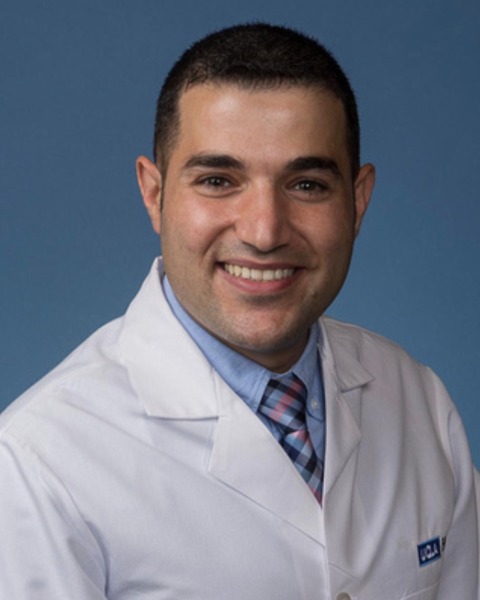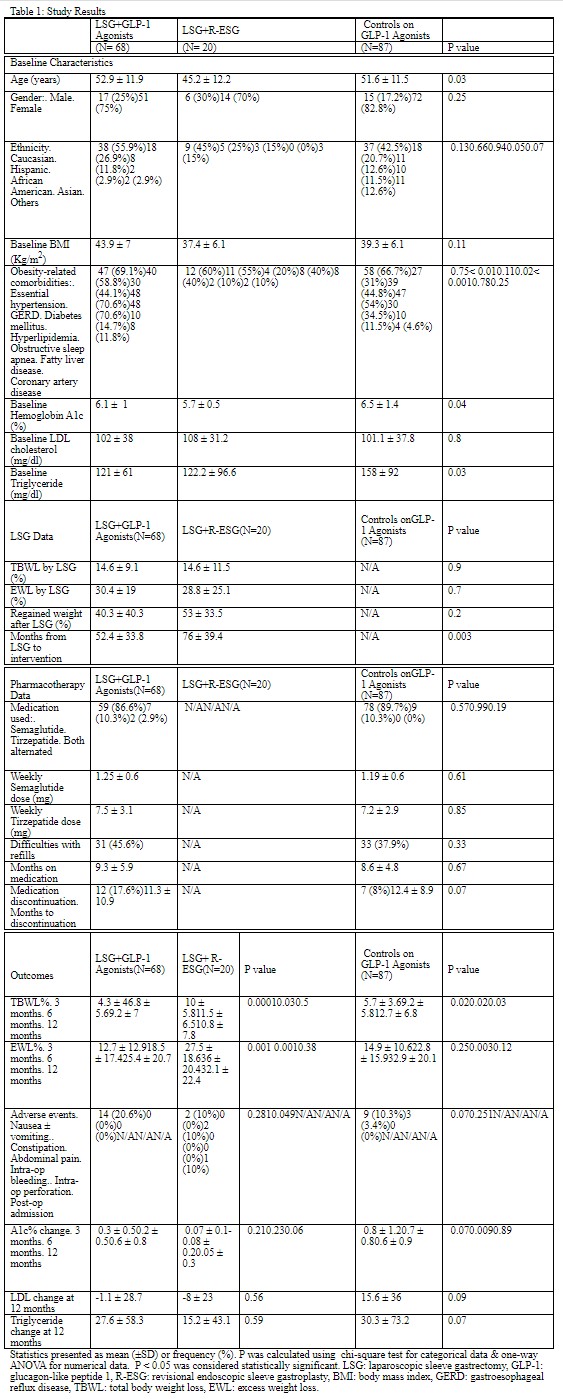Oral Paper Presentation
Annual Scientific Meeting
Session: Plenary Session 4B - IBD / Obesity / Stomach / Pediatrics
65 - Outcomes of Anti-Obesity Glucagon-Like Peptide 1 Agonists vs Revisional Endoscopic Sleeve Gastroplasty for Weight Regain After Laparoscopic Sleeve Gastrectomy: A Case-Control Real World Experience
Wednesday, October 25, 2023
8:30 AM - 8:40 AM PT
Location: Ballroom B

Firas Bahdi, MD (he/him/his)
David Geffen School of Medicine at University of California Los Angeles
Los Angeles, CA
Presenting Author(s)
Award: Outstanding Research Award in the Obesity Category (Trainee)
Firas Bahdi, MD1, Sagar Shah, MD2, Fadi Dahoud, BSc1, Julia L. Boland, MD2, Maryam Farooq, MSEd1, Philip Kozan, MD2, Christopher Paiji, MD2, Jennifer Phan, MD3, Stephen Kim, MD2, Adarsh Thaker, MD2, Erik Dutson, MD2, Na Shen, MD1, V. Raman Muthusamy, MD, MAS2, Danny Issa, MD2
1David Geffen School of Medicine at University of California Los Angeles, Los Angeles, CA; 2UCLA, Los Angeles, CA; 3Keck School of Medicine of USC, Los Angeles, CA
Introduction: Weight regain following laparoscopic sleeve gastrectomy (LSG) is a common and challenging scenario. Minimally invasive options include anti-obesity glucagon-like peptide 1 (GLP1) agonists or revisional endoscopic sleeve gastroplasty (R-ESG). While GLP1 agonists are popular, their efficacy in LSG patients compared with R-ESG or controls with intact stomach is unclear. We share a real-world experience with GLP1 agonists & R-ESG for weight regain after LSG.
Methods: This is a retrospective study of all adult patients with a history of LSG who were treated with Sub-Q Semaglutide or Tirzepatide or underwent R-ESG for weight regain at UCLA Health from Jan 2019 till Jan 2023. A propensity-matched control group of obese patients on GLP1 agonists with no prior bariatric surgery was identified. Primary outcomes included total body weight loss (TBWL%), excess weight loss (EWL%) and adverse events (AE) on follow-up. Secondary outcomes included changes in A1c and lipid panel.
Results: The study groups included 68 (LSG+ GLP1), 20 (LSG + R-ESG), and 87 control patients. Results are presented [Table 1]. R-ESG patients were significantly younger than LSG+ GLP1 or control groups (45.2 vs 52.9 vs 51.6 yrs, P=0.03), respectively. There was no significant difference in patients baseline BMI, diabetes prevalence, %weight loss and regain after LSG, or medication dosage between groups. Difficulty with GLP1 refills was encountered in 31 LSG (45.6%) and 33 controls (37.9%). Regarding outcomes, R-ESG offered a significantly higher TBWL% than GLP1 agonists at three (10% vs 4.3%,P=0.0001) and six months (11.5% vs 6.8%,P=0.03) in LSG patients. GLP1 agonists achieved significantly lower TBWL% in LSG patients than controls at three (4.3% vs 5.7%,P=0.02), six (6.8% vs 9.2%,P=0.02), and twelve months (9.2% vs 12.7%, P=0.03). While LSG + R-ESG patients had significantly higher post-op abdominal pain than LSG+ GLP1 (10% vs 0%,P=0.04), there was no significant difference in other AE. No significant difference in the change of A1c (0.05 vs 0.6, P=0.06), LDL (-8 vs -1.1, P=0.56) or triglyceride levels (15.2 vs 27.6, P=0.59) was seen at 12 months in LSG+ R-ESG vs LSG+ GLP1, respectively.
Discussion: In a real-world experience, anti-obesity GLP1 agonists achieved significantly lower weight loss in LSG patients than those with intact stomach. R-ESG offered significantly higher weight loss than GLP1 agonists in LSG patients with weight regain while also avoiding the difficulties of GLP1 refills, making it an attractive option.

Disclosures:
Firas Bahdi, MD1, Sagar Shah, MD2, Fadi Dahoud, BSc1, Julia L. Boland, MD2, Maryam Farooq, MSEd1, Philip Kozan, MD2, Christopher Paiji, MD2, Jennifer Phan, MD3, Stephen Kim, MD2, Adarsh Thaker, MD2, Erik Dutson, MD2, Na Shen, MD1, V. Raman Muthusamy, MD, MAS2, Danny Issa, MD2, 65, Outcomes of Anti-Obesity Glucagon-Like Peptide 1 Agonists vs Revisional Endoscopic Sleeve Gastroplasty for Weight Regain After Laparoscopic Sleeve Gastrectomy: A Case-Control Real World Experience, ACG 2023 Annual Scientific Meeting Abstracts. Vancouver, BC, Canada: American College of Gastroenterology.
Firas Bahdi, MD1, Sagar Shah, MD2, Fadi Dahoud, BSc1, Julia L. Boland, MD2, Maryam Farooq, MSEd1, Philip Kozan, MD2, Christopher Paiji, MD2, Jennifer Phan, MD3, Stephen Kim, MD2, Adarsh Thaker, MD2, Erik Dutson, MD2, Na Shen, MD1, V. Raman Muthusamy, MD, MAS2, Danny Issa, MD2
1David Geffen School of Medicine at University of California Los Angeles, Los Angeles, CA; 2UCLA, Los Angeles, CA; 3Keck School of Medicine of USC, Los Angeles, CA
Introduction: Weight regain following laparoscopic sleeve gastrectomy (LSG) is a common and challenging scenario. Minimally invasive options include anti-obesity glucagon-like peptide 1 (GLP1) agonists or revisional endoscopic sleeve gastroplasty (R-ESG). While GLP1 agonists are popular, their efficacy in LSG patients compared with R-ESG or controls with intact stomach is unclear. We share a real-world experience with GLP1 agonists & R-ESG for weight regain after LSG.
Methods: This is a retrospective study of all adult patients with a history of LSG who were treated with Sub-Q Semaglutide or Tirzepatide or underwent R-ESG for weight regain at UCLA Health from Jan 2019 till Jan 2023. A propensity-matched control group of obese patients on GLP1 agonists with no prior bariatric surgery was identified. Primary outcomes included total body weight loss (TBWL%), excess weight loss (EWL%) and adverse events (AE) on follow-up. Secondary outcomes included changes in A1c and lipid panel.
Results: The study groups included 68 (LSG+ GLP1), 20 (LSG + R-ESG), and 87 control patients. Results are presented [Table 1]. R-ESG patients were significantly younger than LSG+ GLP1 or control groups (45.2 vs 52.9 vs 51.6 yrs, P=0.03), respectively. There was no significant difference in patients baseline BMI, diabetes prevalence, %weight loss and regain after LSG, or medication dosage between groups. Difficulty with GLP1 refills was encountered in 31 LSG (45.6%) and 33 controls (37.9%). Regarding outcomes, R-ESG offered a significantly higher TBWL% than GLP1 agonists at three (10% vs 4.3%,P=0.0001) and six months (11.5% vs 6.8%,P=0.03) in LSG patients. GLP1 agonists achieved significantly lower TBWL% in LSG patients than controls at three (4.3% vs 5.7%,P=0.02), six (6.8% vs 9.2%,P=0.02), and twelve months (9.2% vs 12.7%, P=0.03). While LSG + R-ESG patients had significantly higher post-op abdominal pain than LSG+ GLP1 (10% vs 0%,P=0.04), there was no significant difference in other AE. No significant difference in the change of A1c (0.05 vs 0.6, P=0.06), LDL (-8 vs -1.1, P=0.56) or triglyceride levels (15.2 vs 27.6, P=0.59) was seen at 12 months in LSG+ R-ESG vs LSG+ GLP1, respectively.
Discussion: In a real-world experience, anti-obesity GLP1 agonists achieved significantly lower weight loss in LSG patients than those with intact stomach. R-ESG offered significantly higher weight loss than GLP1 agonists in LSG patients with weight regain while also avoiding the difficulties of GLP1 refills, making it an attractive option.

Table: Table 1: Study Results
Footnotes: Statistics presented as mean (±SD) or frequency (%). P was calculated using chi-square test for categorical data & one-way ANOVA for numerical data. P < 0.05 was considered statistically significant. LSG: laparoscopic sleeve gastrectomy, GLP-1: glucagon-like peptide 1, R-ESG: revisional endoscopic sleeve gastroplasty, BMI: body mass index, GERD: gastroesophageal reflux disease, TBWL: total body weight loss, EWL: excess weight loss.
Footnotes: Statistics presented as mean (±SD) or frequency (%). P was calculated using chi-square test for categorical data & one-way ANOVA for numerical data. P < 0.05 was considered statistically significant. LSG: laparoscopic sleeve gastrectomy, GLP-1: glucagon-like peptide 1, R-ESG: revisional endoscopic sleeve gastroplasty, BMI: body mass index, GERD: gastroesophageal reflux disease, TBWL: total body weight loss, EWL: excess weight loss.
Disclosures:
Firas Bahdi indicated no relevant financial relationships.
Sagar Shah indicated no relevant financial relationships.
Fadi Dahoud indicated no relevant financial relationships.
Julia Boland indicated no relevant financial relationships.
Maryam Farooq indicated no relevant financial relationships.
Philip Kozan indicated no relevant financial relationships.
Christopher Paiji indicated no relevant financial relationships.
Jennifer Phan: Boston Scientific – Consultant. Cook Medical – Consultant. Olympus – Consultant.
Stephen Kim: Boston Scientific – Consultant. Exact sciences – Consultant.
Adarsh Thaker: Apollo Endosurgery – Advisory Committee/Board Member, Consultant. Boston Scientific Corporation – Consultant, Speakers Bureau. Neptune Medical – Consultant. Steris – Consultant.
Erik Dutson indicated no relevant financial relationships.
Na Shen indicated no relevant financial relationships.
V. Raman Muthusamy: Boston Scientific – Consultant, Grant/Research Support. Capsovision – Stock Options. Endogastric Solutions – Advisory Committee/Board Member. Motus GI – Advisory Committee/Board Member.
Danny Issa indicated no relevant financial relationships.
Firas Bahdi, MD1, Sagar Shah, MD2, Fadi Dahoud, BSc1, Julia L. Boland, MD2, Maryam Farooq, MSEd1, Philip Kozan, MD2, Christopher Paiji, MD2, Jennifer Phan, MD3, Stephen Kim, MD2, Adarsh Thaker, MD2, Erik Dutson, MD2, Na Shen, MD1, V. Raman Muthusamy, MD, MAS2, Danny Issa, MD2, 65, Outcomes of Anti-Obesity Glucagon-Like Peptide 1 Agonists vs Revisional Endoscopic Sleeve Gastroplasty for Weight Regain After Laparoscopic Sleeve Gastrectomy: A Case-Control Real World Experience, ACG 2023 Annual Scientific Meeting Abstracts. Vancouver, BC, Canada: American College of Gastroenterology.


